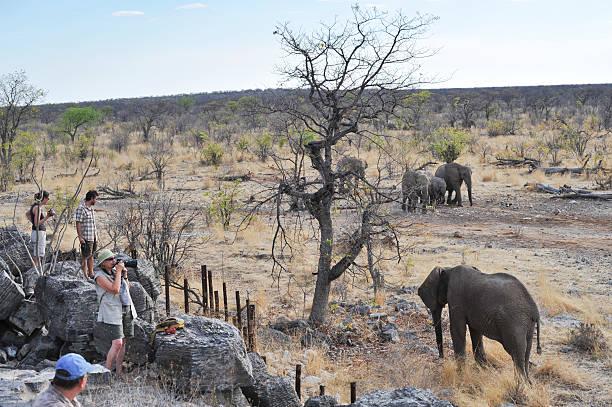
Namibia, with its vast landscapes, diverse wildlife, and thriving ecotourism industry, is one of the best places in the world for safari guide training. Whether you dream of leading safari tours through the Namib Desert, tracking big game in Etosha National Park, or educating visitors about conservation efforts, Namibia provides the perfect environment for aspiring safari guides. This comprehensive guide explores what safari guide training in Namibia entails, the skills required, career opportunities, and why this country is an ideal training ground for wildlife enthusiasts.
Why Choose Namibia for Safari Guide Training?
Namibia offers a unique setting for safari guide training due to its diverse ecosystems, well-established conservation programs, and reputable training institutions. Here are a few reasons why Namibia stands out as a top destination:
- Diverse Wildlife – Namibia is home to iconic African species such as lions, elephants, rhinos, cheetahs, and giraffes, providing an excellent learning environment.
- Varied Landscapes – Trainees gain experience in deserts, savannas, and wetlands, preparing them for guiding in different terrains.
- Strong Conservation Ethos – Namibia has pioneering conservation programs, including community-based conservancies that allow trainees to understand sustainable tourism firsthand.
- Reputable Training Institutions – Many accredited training programs in Namibia offer internationally recognized certifications.
What Does Safari Guide Training Involve?
Becoming a safari guide requires intensive training, both in theory and practice. Most programs include classroom instruction, field training, and assessments. Here’s what trainees can expect:
1. Wildlife and Ecology Education
Understanding animal behavior, ecology, and conservation principles is crucial for a safari guide. Training covers:
- Identification of mammals, birds, reptiles, and plants
- Animal tracking and behavior interpretation
- Understanding ecosystems and food chains
2. Guiding Skills and Customer Service
A great safari guide must be a skilled communicator and storyteller. Training includes:
- How to conduct game drives and walking safaris
- Public speaking and interpretation skills
- Guest safety and emergency procedures
- Creating engaging and educational safari experiences
3. Navigation and Survival Skills
Trainees learn how to navigate the wilderness, use maps and GPS, and handle emergencies such as vehicle breakdowns or lost tourists. Other skills include:
- 4x4 off-road driving
- Wilderness first aid and safety protocols
- Firearm handling for dangerous wildlife encounters (in some programs)
4. Conservation and Ethical Guiding
Namibia places a strong emphasis on responsible tourism. Guides are trained in:
- Sustainable tourism practices
- Conservation challenges and solutions
- Working with local communities and ecotourism initiatives
Top Safari Guide Training Programs in Namibia
Several institutions in Namibia offer world-class safari guide training, with certifications recognized across Africa. Some top training providers include:
1. EcoTraining
EcoTraining is one of Africa’s leading field guide training institutions. Their Namibia program offers immersive wilderness experiences, covering everything from animal behavior to 4x4 driving skills.
2. Namibia Academy for Tourism and Hospitality (NATH)
NATH provides accredited training courses, focusing on customer service, ecology, and practical guiding skills. Their qualifications meet national and international tourism standards.
3. FGASA-Endorsed Training Programs
The Field Guides Association of Southern Africa (FGASA) certification is highly regarded in the safari industry. Some Namibian training programs offer FGASA-endorsed courses, which can boost employment prospects.
Career Opportunities for Trained Safari Guides
After completing training, safari guides have a range of career opportunities in Namibia and beyond. Common job roles include:
- Safari Lodge Guide – Leading game drives and bush walks at luxury lodges
- Specialist Wildlife Guide – Focusing on specific areas such as birdwatching or photography safaris
- Conservation Ranger – Working with anti-poaching and wildlife monitoring teams
- Community-Based Tourism Guide – Leading cultural and wildlife tours in local conservancies
- Eco-Tourism Manager – Overseeing sustainable tourism projects and guiding operations
What to Consider Before Enrolling in Safari Guide Training
If you’re considering safari guide training in Namibia, here are some key factors to keep in mind:
1. Accreditation and Certification
Ensure the training program is accredited and provides recognized qualifications, such as FGASA certification or national guiding diplomas.
2. Course Duration and Cost
Programs range from a few weeks to several months. Costs vary, covering tuition, accommodation, and field training. Some programs offer scholarships or work placements.
3. Physical Fitness and Commitment
Safari guiding requires stamina and adaptability. You’ll spend long hours outdoors, often in extreme conditions, so physical fitness is essential.
4. Job Placement and Career Support
Some training providers offer job placement assistance or internships with lodges and conservation projects. Research the program’s success in helping graduates find employment.
Final Thoughts
Training to become a safari guide in Namibia is an enriching experience that combines adventure, education, and conservation. Whether you’re looking for a career change, a gap-year experience, or a long-term profession in wildlife tourism, Namibia’s diverse landscapes and expert training programs provide the perfect foundation. With the right training, you can embark on a rewarding journey that allows you to share the wonders of the African wilderness with visitors from around the world.

